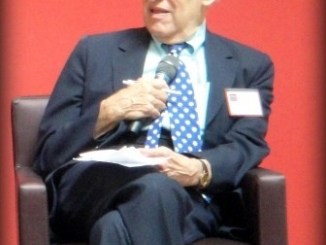
Ezra Vogel: The Joy of the Biographers (Peking University)
Peking University, Stanford Center:
Ezra Vogel talks about his latest book on Deng Xiaoping
and the joy of the biographers
On the joys of the biographers:
“One of the things that made it so much fun was to put the pieces together… had Deng Xiaoping written it all down in detail, the biography would be not much fun. As a scholar you do like puzzle work.”
On government and legitimacy:
“How can the government have legitimacy if no growth? They need more accountability.”
On why Westerners write Chinese history:
“The Chinese could probably have written better books about Deng Xiaoping if they were allowed to.”
“A Lot of credit for my books goes to those Chinese who couldn’t write what they think, but who could tell it to me so that I can write it.”

On Guanxi and the Chinese Connection:
“I used all the guanxi I possible could [for writing my book about Deng].”
Ezra Vogel criticize Deng Xiaoping:
“He did some awful things.”
Ezra Vogel: Not mentioning human rights was helpful:
“I never told sufficiently about human rights…, so when the books was published into Chinese that was helpful.”
On publishing in China:
“When the book publisher in Hong Kong, the Chinese University Press, translated my book they did a wonderful job; they quoted the original (Chinese) thought [where I worked with English translations].”
On cultural difference in translation:
“Deng was born in August but China’s New Year is in February; and the date of birth is often the date of conception, so often the Chinese translators had to recalculate from English into Chinese dates.”
On publishing in Hong Kong and Mainland China:
“We put pressure on the mainland. This commitment to promote sensitive knowledge about what propaganda would allow.”
“The Chinese translation had few adaptations, but as a whole the main argument of the book is intact.”
On the art of interviewing:
“I got training on intensive interviewing which was extremely helpful.”
“I am often asked: Ezra, who was it possible to have so many contacts? It is because I like guanxi and used all the connection I possible could.”
On Deng Xiaoping and corruption:
“Deng set up a system where power is restrained.”
“He tolerated unethical behavior and did not punish officials if they were successful… of course, now we have corruption.”
On Deng Xiaoping and his relation to Mao Zedong:
“Deng did not criticize Mao as a great leader. So this gave him some room, he could get rid of the big socialist structure.”
Qin Hui (PKU Professor of History) on Deng Xiaoping’s legacy:
Qin Hui: “We are still not at the end of this revolution.”
Qin Hui: “We are partly in romantic nostalgia about the cultural revolution, but in reality this was a very embarrassing part of our history.”
[StanfordCenter,PekingUniversity, 23 April 2013, 10:00-12:00]









